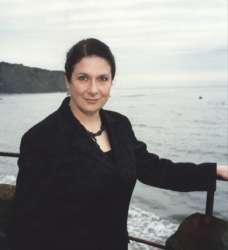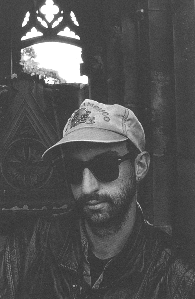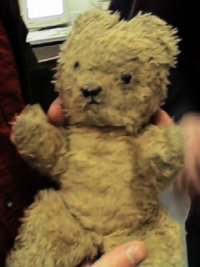My Friend In The North
by Gail-Nina Anderson

"There aren't many things I do really well," says Mr. Brenchley, gazing disconsolately at the bar-food menu in front of him, "but cooking is one of them."
Right, I know the signs - that means we're not eating this lunchtime because the food is mediocre fare in the flabbiest tradition of pub grub, but we had to meet in a bar because we'd need a drink (or several) to lubricate the afternoon. But now food has been introduced, a seductive image of Chaz'z Chinese Pork comes into mind: or his Thai Prawns or his Lamb Hotpot...
"I love putting ingredients together, finding the perfect match and then fiddling with it to make it even better. It's an ego thing, really."
I wonder if something similar could be said about his writing.
 "I can't remember when I didn't write. I've been scribbling since I was this high." He places his hand quite close to the floor, contemplates it for a moment and shakes his head. "Naw - I was 22 inches long when I was born, so I was never that short."
"I can't remember when I didn't write. I've been scribbling since I was this high." He places his hand quite close to the floor, contemplates it for a moment and shakes his head. "Naw - I was 22 inches long when I was born, so I was never that short."
Chaz is, indeed, a mite on the tall side. Also, he's very nearly sinister. If you've seen the photo of him currently in use on all publicity, where he looms louchly in a cemetery, all dark glasses and saturnine menace, then you'll know exactly how he looks, but not at all how he comes across. He's a big softy really, whose conversation tends to be punctuated by bursts of verbal and gestual enthusiasm as he waves a pint in one hand, a cigar in the other, and expounds some point of paronomasia. That's word-play to you and me, and his books are littered with puns, onto which topic we instantly digress.
"Our language is wonderfully rich, because there have been so many things feeding into English during the last millennium. How can you resist playing with it?"
The chapter headings in his 1996 novel, Dispossession, bear witness to this. One of the characters (a fallen angel, as it happens) is called Luke, and we have Luke Back In Anger and Just One, Luke, and I forgot everything etc. etc. Literary sleight of hand of this kind remains unusual in a contemporary chiller with supernatural overtones, but then Chaz has always been a law unto himself. For one thing, the eight notably well-received novels he's written for Hodder have proved notably difficult to pigeon-hole in today's genre-led market. For another, he's disarmingly up front about his unlikely beginnings in authorship.
"I was 18, I'd just left university (two terms' worth of Theology at St. Andrews - it didn't take). I needed to support myself and I wanted to write. My kid sister of 15 was reading lots of Teen Romance mags, I picked them up and thought 'I could do that', and for the next ten years I did. At first, it was story outlines and 'bubbles' of dialogue for the strip-cartoon style of story, then photo-romances took over and I wrote for them. I did all the greats - Jackie, Blue Jeans, Oh Boy!, Patches. I produced my first story in the horror vein for Just 17 - girl meets boy, boy turns out to be gentle, considerate vampire, they visit the blood bank and both migrate to Australia.
"Under my pen-name of Carol Trent I moved into full length fiction, writing a romantic thriller for a series Fontana was introducing around 1983. Needless to say, the series bombed."
So when did he move from being pink and fluffy to tales of sadistic serial killers and supernatural powers?
"I got an agent, Carol Smith, who had just handled the British edition of Thomas Harris' Red Dragon, had seen the potential of it and was keen to push me in a similar direction. This was '83, and the flood of fictional serial-killers had hardly begun. I liked the idea of a crime-based plot with a mystery to be unravelled - I was reading John Le Carré, Dick Francis, early Stephen King at the time - and I just wanted a hook to hang it all on. On the way home from discussing it with Carol, I saw a poster advertising the Samaritans, and I had my theme.
"Being me, I did practically no research, and when the book was in its proof stage I got a letter from Hodder's solicitors tactfully pointing out that as I'd very specifically made my fictional characters members of the Newcastle Samaritans and police force, it might be a good idea to check that I hadn't accidentally used the names of any real people. At this point I had a very pleasant chat with the Samaritans, and indeed with the police, which was just as well since my alcoholic, ex-policeman main character, thrown out of the force for beating up a prisoner did have the same name as a local copper.
"It was the Samaritan link that nearly caused problems, though. A regional scandal-sheet, the Sunday Sun, tried to drum up a story by phoning them and asking pointedly if they were horrified by the book. They handled it beautifully, saying that my novel was clearly to be read as a work of fiction, and anyway would serve to remind people that the Samaritans were there.
"The idea for the next one, The Refuge, fell into my lap like a gift from the gods, when I heard a radio item on a refuge for runaway teens which was technically illegal, so that even the police didn't have its details. I'm drawn to situations which put people on the edge of society."
This was followed by The Garden, Mall Time,Paradise,Dead of Light, Dispossession and Light Errant. With a back-list that long, I wonder whether he's had any nibbles from film or TV companies. I can't judge what's going on behind the dark glasses, but the mouth relaxes into a trademark Brenchley grin.
"Well, in so far as it's possible when writing a novel, I saw Mall Time as an action film - then realised I hadn't put in a hero. Well, there is a more-or-less central character, but he isn't exactly Bruce Willis. He works in a shopping mall (The Meldon Centre - to get the joke you should know that the two local malls are the Metro and Eldon Centres), doesn't get the girl, totally fails when he tries any Die Hard style action - oh, and has an artificial arm, which is a significant part of the plot.
"Amazingly enough, I did once find a message on my answering machine concerning a possible Hollywood deal on the novel, but needless to say it never got carried through. There was a genuine interest in adapting Dead of Light but it was from a small company who couldn't afford the special effects."
I note that, even in daydreams of movie fame, Chaz talks about action rather than horror films. Yet his novels always seem to find their bookshop niche on the horror shelves. Does the label trouble him?
"I'm not convinced that it's appropriate. Most of my books are thrillers - admittedly, pretty nasty ones, and not all of them have any supernatural element. Hodder took the decision to promote Paradise specifically as horror. The earlier ones really came under the crime label, though the covers tended to look like horror. I didn't notice that their decision sold any more copies! Paradise is really about Evangelic Christianity, which I suppose could be viewed as a pretty frightening subject. I wanted to write a book where faith-healing and miracles apparently occur, but where you come to realise that any phenomena so inexplicable in a purely rational scheme of things could just as well be bad as good. I'd like to imagine Christian readers of the book would end assuming I believe in God, while non-believers wouldn't."
And does he?
"Er - no, though I'm fascinated by religion. I went through a phrase of anguished belief in my mid-teens, but that was largely because I was screwed up about my sexuality. The closest thing to a theological point in Paradise is that both good and evil can arise from things that appear to be the other. I'm not inspired by a black-and-white scheme of morals, all those post-Stephen King novels which pit a monster against the good guys. That's not life as I know it."
Is it time to lighten the mood by mentioning the hats, the wide selection of baseball caps that are part of the patented look? Or, indeed, the cats? Chaz has two small, black ones, called Sophonisba and Artemisia. Daft names, but as I seem to recall suggesting them myself, I can't really criticise.
"Oh, you mean Sophie and Misha, my darling kiddycats. We're inseparable, they follow me round the flat, drive me crazy when I'm working, wake me up at 3 a.m. by sitting on my face..."
As we're well into the area of personal revelations, this may be the point to prod the slightly edgy subject of Chaz'z reluctant notoriety last year, when he wandered into a public wrangle with mystery writer P.D. James.
 "It was 2.30 a.m., I was in bed with the cats listening to an item on crime writing on the World Service, and P.D. James said something I found completely outrageous. Her implication was that crime novels really have to feature well-educated, middle-class characters, because these are the people in a position to make moral choices. By contrast, in the pits of the inner cities, where crime is apparently the norm and murder is common-place, moral choice simply isn't a factor.
"It was 2.30 a.m., I was in bed with the cats listening to an item on crime writing on the World Service, and P.D. James said something I found completely outrageous. Her implication was that crime novels really have to feature well-educated, middle-class characters, because these are the people in a position to make moral choices. By contrast, in the pits of the inner cities, where crime is apparently the norm and murder is common-place, moral choice simply isn't a factor.
"I wrote a letter of rebuttal to the Crime Writers' Association's newsletter without realising what a rumpus it would cause, and ended up speaking privately (and amicably) to P.D. James and agreeing that enough had been said on the subject. The editor of the C.W.A. newsletter declared an end to the debate and it should have finished there, but a member of the Association leaked the story to the press and it became huge, front-page stuff. I was chased for interviews, and it all got out of hand. I did enjoy one very pleasant little feature in The Independent diary column, which made mention of my teddy bear, but they called him 'Sorry' instead of 'Softly'."
I'm glad we cleared that one up, but the story once again places Chaz in a context of crime writing rather than horror.
"I do have an exclusively 'horrific' persona. Daniel Fox, the pen-name under which I've produced short stories for Dark Voices and other anthologies. But amongst the Brenchley novels, Dead of Light and its sequel, Light Errant, were definitely conceived as horror. I was living in the rough West End of Newcastle where a couple of gangster families dominate a lot of the local scene. You find them in the local cemetery too. So I developed a notion of a town run Mafia-style - but by magic powers.
"I followed this up with Dispossession, which was initially going to be a mystery where the hero (and the reader) has to fill in three months of amnesia. When my editor asked if there was any supernatural element, I said: 'Would you like one?', and I found myself inventing the figure of an earthbound angel, whose presence then contributed largely to the way the story developed."
So is he now hooked on supernatural horror?
"O.K., two different projects, two different answers. Last year, a small North Eastern press, Flambard, brought out Blood Waters, a collection of stories I produced as Writer in Residence to a sculpture project in Sunderland (which, indeed, is the only real job I've had in my life). They were based very firmly in the real world, in specific locations, in social conditions visible around me, and I felt very good about writing in that way.
"On the other hand, my current project is a new departure, another way of describing the world by inventing a new one. I'm writing an expanding fantasy tetralogy (that's four, but possibly more). When Hodder slashed the advances they were paying their authors I felt it was time to move on, so I developed an outline for a multi-volume fantasy and sent it to Legend, who took all of three hours to make me an offer for it. I didn't need any encouragement to turn to fantasy, which I've loved since I read Tolkien at an impressionable age. But there was no point in writing another Tolkien imitation, and I must have waited about 20 years for a suitably original central idea to fall out of the Heavens. Then a couple of years ago I found a Folio Society leaflet advertising Runciman's History Of The Crusades and that was it. It's already involved a lot of research, though these definitely won't be historical novels. I use the real Crusades and the Middle Eastern setting, but my story departs dramatically from any historical pattern of events and is full of magic, often pretty brutal. I've avoided the inevitable fantasy dragon in favour of the myths of the area. So we have Djinns, Afrits and Ghouls."
I gently nudge him about a likely date for Tower of the King's Daughter, the first volume of The Books Of Outremer, and he speculates cautiously about the spring of 1998.
By now lunchtime has meandered well into the afternoon, the San Miguel bottles bedeck our table in lavish array, and I still haven't asked such staple questions as his favourite contemporary authors.
"Michael Marshall Smith, Nick Royle, Graham Joyce, Iain Banks, Geoff Ryman and, for fantasy, Guy Gavriel Kay. Aren't you going to ask me about the sex-changing Monk Assassins before we finish?"
This is a favourite Chaz topic, the idea for a novel so outrageous that no publisher has yet to commission it. As he gets into his stride about the lengthy and painful process whereby his favourite characters will use their mental powers to alter their bodies (and gender) I note the sun sinking slowly in the west and the barman beckoning seductively. One more round, and Brenchley may well start extolling the virtues of his amphibious sandals, but I suspect your dedicated interviewer will by then be considerably beyond the capacity to take coherent notes.
Read more interviews or return to home page.
First published in Samhain Issue 62